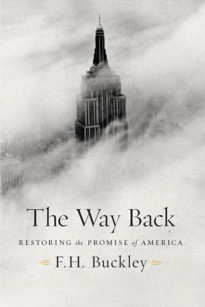Virginians should celebrate their independence a little bit earlier than July 4th , says F.H. Buckley, professor at George Mason Law School and author of The Way Back. On June 29th 1776, Virginia adopted George Mason’s draft of the first state constitution and thus became the first state to formally declare independence from the British, five days before the signing of the Declaration of Independence in Philadelphia.
Buckley writes about the underrated George Mason in today’s Richmond Times Dispatch:
Truth is, Mason was not the most clubbable of men. Choleric, impatient, and argumentative are words that come to mind, were one asked to describe him. And yet there was something more. Mason was a Hegelian world-historical figure, a person who represented a new principle in the advance of the human spirit — with the difference that Mason’s Virginia was more advanced still than the bureaucratic Prussian state that Hegel thought represented the end point of history.
What Hegel had missed, and Mason had grasped, is that freedom is fragile without the bulwark of strong legal institutions, of the kind Mason would provide. And that is what makes Mason one of the half-dozen most important Founders, one of the greatest figures in world history. For it is to Mason that we owe the enactment of the first comprehensive bill of rights, in the Virginia Declaration of Rights; the first modern written constitution; and, with Jefferson, the first declaration of independence from Great Britain.
Mason began with his Declaration of Rights, which offered an intellectual defense for independence. Here’s what it said:
“Government is, or ought to be, instituted for the common benefit, protection, and security of the people, nation, or community; … And that, when any government shall be found inadequate or contrary to these purposes, a majority of the community has an indubitable, inalienable, and indefeasible right to reform, alter, or abolish it.”
Mason drafted this in the third week of May 1776, and fellow delegate Thomas Lee sent a copy of it to his brother, Mason’s close friend, Richard Henry Lee at the Continental Congress in Philadelphia. On June 7 Richard Lee rose in Congress and moved “that these United Colonies are, and of right ought to be, free and independent states, that they are absolved from all allegiance to the British crown, and that all political connection between them and the state of Great Britain is, and ought to be, totally dissolved.” That led to the Declaration of Independence on July 4, and it began with Mason’s Declaration of Rights.
Read the full article here, and read more of F.H. Buckley in The Way Back: Restoring the Promise of America.
